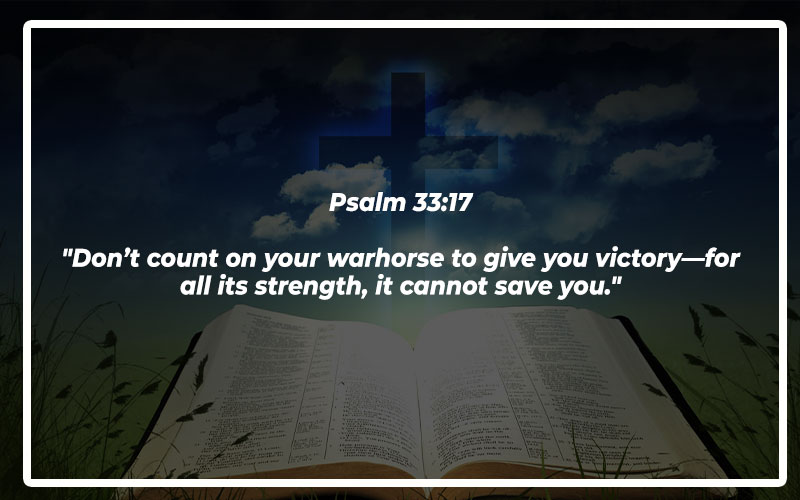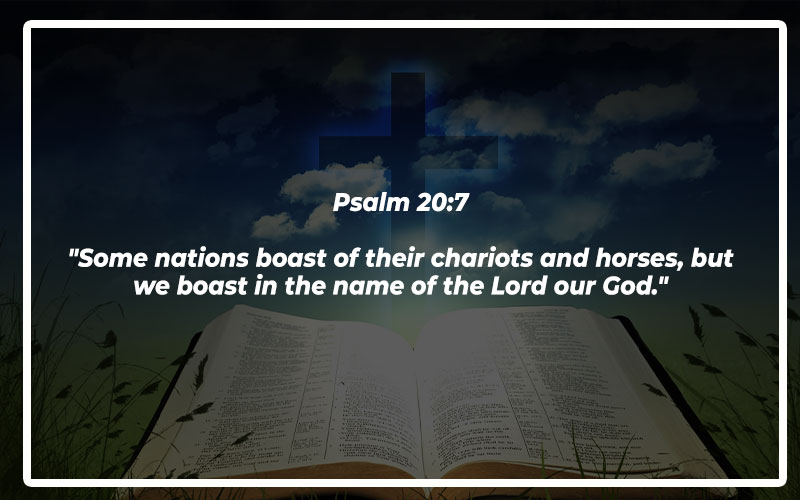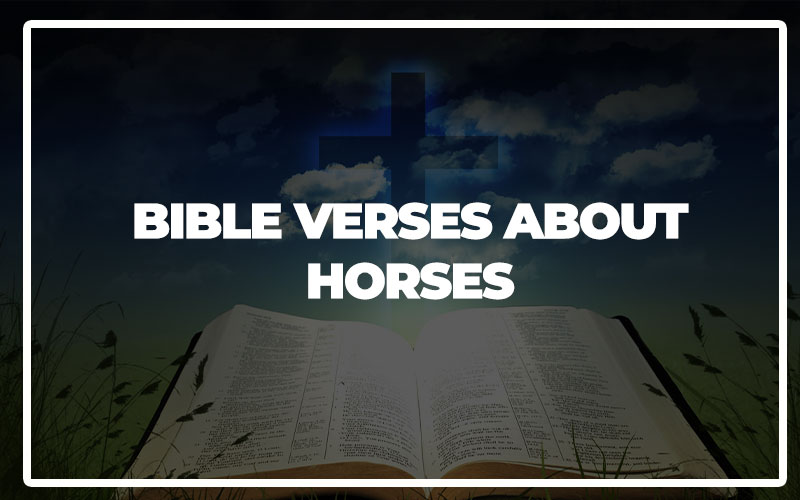The Bible often uses horses to symbolize strength, power, and even spiritual lessons. These majestic creatures are woven into stories, prophecies, and parables to illustrate both God’s glory and human frailty. Below are key themes about horses in the Bible, accompanied by verses and reflections that reveal their biblical significance.
Also Read: Bible Verses About Caring For Animals
Horses as Symbols of Strength
Horses are renowned for their strength and speed, and the Bible often references these traits to convey messages about human reliance on earthly power versus God’s ultimate sovereignty. These verses remind us to trust in the Lord above all else.
Psalm 33:17
“Don’t count on your warhorse to give you victory—for all its strength, it cannot save you.”

This verse warns against placing our trust in earthly strength or resources. While horses are strong, they cannot compare to God’s saving power, urging us to rely fully on Him for deliverance and victory.
Proverbs 21:31
“The horse is prepared for the day of battle, but the victory belongs to the Lord.”
Preparation is important, but this verse emphasizes that true victory comes from the Lord. It teaches us that while we may work hard, success ultimately rests in God’s hands.
Job 39:19-21
“Have you given the horse its strength or clothed its neck with a flowing mane? Did you give it the ability to leap like a locust? Its majestic snorting is terrifying!”
God’s rhetorical question to Job showcases His unmatched power as Creator. The horse’s strength and beauty reflect God’s craftsmanship and serve as a reminder of His greatness.
Psalm 147:10
“He takes no pleasure in the strength of a horse or in human might.”
This verse reminds us that God values humility and faith over physical strength or human achievement. Horses may symbolize power, but they pale in comparison to the power of a heart aligned with God.
Isaiah 31:1
“What sorrow awaits those who look to Egypt for help, trusting their horses, chariots, and charioteers instead of looking to the Lord, the Holy One of Israel.”
Trusting in horses or earthly armies reflects misplaced faith. God calls His people to rely on Him rather than worldly powers, reminding us of His ultimate authority and faithfulness.
Horses in Prophecy
Horses frequently appear in prophetic visions, symbolizing divine judgment, warfare, or the fulfillment of God’s plans. These references point to the majesty and sovereignty of God in history and the future.
Zechariah 6:2-3
“The first chariot was pulled by red horses, the second by black horses, the third by white horses, and the fourth by powerful dappled-gray horses.”
These horses in Zechariah’s vision symbolize God’s control over the nations. Their colors represent different aspects of judgment and mercy, reminding us that God’s plans are perfect and comprehensive.
Revelation 6:2
“I looked up and saw a white horse standing there. Its rider carried a bow, and a crown was placed on his head. He rode out to win many battles and gain the victory.”
This verse introduces the first of the Four Horsemen of the Apocalypse, symbolizing conquest. It serves as a reminder that God’s purposes unfold even amid human events and spiritual warfare.
Revelation 19:11
“Then I saw heaven opened, and a white horse was standing there. Its rider was named Faithful and True, for he judges fairly and wages a righteous war.”
This prophetic image of Christ as a warrior on a white horse emphasizes His role as the ultimate judge and victor. It assures believers of His triumph over evil.
Jeremiah 8:6
“I listen to their conversations and don’t hear a word of truth. Is anyone sorry for doing wrong? They rush to commit murder. Like a horse charging into battle!”
The imagery of a horse charging into battle illustrates humanity’s impulsive nature in pursuing sin. It’s a call to repentance and reflection on the consequences of our actions.
Habakkuk 3:8
“Was it in anger, Lord, that you struck the rivers and parted the sea? Were you displeased with them? No, you were sending your chariots of salvation!”
The reference to chariots of salvation highlights God’s power to deliver His people. Horses here symbolize divine intervention and rescue, pointing to God’s redemptive work in history.
Horses as Symbols of War
Horses often represent warfare in the Bible, highlighting humanity’s reliance on military power and God’s overarching sovereignty in battles. These verses remind us of the futility of trusting in human strength over divine protection.
Exodus 15:1
“Then Moses and the people of Israel sang this song to the Lord: ‘I will sing to the Lord, for he has triumphed gloriously; he has hurled both horse and rider into the sea.'”
This verse celebrates God’s deliverance of Israel from Egypt. By destroying Pharaoh’s horses and chariots, God demonstrated His power over human military might, showing that He alone is the ultimate defender.
Jeremiah 46:4
“Harness the horses, and mount the stallions. Take your positions. Put on your helmets. Sharpen your spears, and prepare your armor.”
This verse captures the preparation for battle, underscoring the seriousness of human conflict. However, it also serves as a backdrop to God’s judgment, reminding us that He is the one who ultimately controls the outcomes of war.
Isaiah 2:7
“Israel is full of silver and gold; there is no end to its treasures. Their land is full of warhorses; there is no end to their chariots.”
Here, the abundance of warhorses symbolizes Israel’s misplaced trust in material wealth and military strength. The verse calls for dependence on God rather than worldly resources for true security.
Revelation 6:4
“Then another horse appeared, a red one. Its rider was given a mighty sword and the authority to take peace from the earth. And there was war and slaughter everywhere.”
This verse depicts the second Horseman of the Apocalypse, representing war and strife. It highlights the destructive consequences of humanity’s sin and the sovereignty of God even amidst chaos.
Proverbs 20:18
“Plans succeed through good counsel; don’t go to war without wise advice.”
This verse underscores the importance of wisdom in decision-making, especially in matters of conflict. Trusting in God’s guidance is critical for achieving peace and avoiding unnecessary strife.
Horses and God’s Judgment
In many passages, horses are associated with divine judgment, emphasizing God’s righteousness and authority. These verses remind us that God is just and His judgments are perfect.
Jeremiah 4:13
“Our enemy rushes down on us like storm clouds! His chariots are like whirlwinds; his horses are swifter than eagles. How terrible it will be, for we are doomed!”
This verse paints a vivid picture of God’s judgment through the metaphor of horses. It calls for repentance and humility before the Lord to avoid the consequences of sin.
Revelation 19:14
“The armies of heaven, dressed in the finest of pure white linen, followed him on white horses.”
This imagery of heavenly armies on white horses symbolizes divine justice and the ultimate victory of Christ. It reassures believers of God’s power and the certainty of His judgment against evil.
Habakkuk 1:8
“Their horses are swifter than cheetahs and fiercer than wolves at dusk. Their charioteers charge from far away. Like eagles, they swoop down to devour their prey.”
Habakkuk describes the Babylonians as instruments of God’s judgment. The swiftness of their horses reflects the inevitability and thoroughness of God’s plans, urging His people to turn to Him in faith.
Zechariah 10:3
“My anger burns against your shepherds, and I will punish these leaders. For the Lord of Heaven’s Armies has arrived to look after Judah, his flock. He will make them strong and glorious, like a proud warhorse in battle.”
This verse highlights God’s transformation of His people into instruments of His will. The imagery of a warhorse demonstrates their strength and purpose under God’s leadership.
Revelation 9:17
“And in my vision, I saw the horses and the riders sitting on them. The riders wore armor that was fiery red and dark blue and yellow. The horses had heads like lions, and fire and smoke and burning sulfur billowed from their mouths.”
This apocalyptic vision symbolizes divine judgment and the devastating consequences of sin. It serves as a powerful reminder of the need for repentance and faith in God’s mercy.
Horses as Symbols of Victory
The Bible often portrays horses as symbols of triumph and victory, especially in God’s deliverance of His people. These verses celebrate God’s power and His ability to overcome any obstacle.
1 Kings 4:26
“Solomon had 4,000 stalls for his chariot horses, and he had 12,000 horses. He stationed some of them in the chariot cities and some near him in Jerusalem.”
This verse reflects the prosperity and strength of Solomon’s reign. The abundance of horses signifies Israel’s success under God’s blessing and provision.
Revelation 19:19
“Then I saw the beast and the kings of the world and their armies gathered together to fight against the one sitting on the horse and his army.”
This verse highlights the ultimate victory of Christ over evil. The rider on the horse symbolizes Jesus’ authority and power to bring about His kingdom.
2 Kings 2:11
“As they were walking along and talking, suddenly a chariot of fire appeared, drawn by horses of fire. It drove between the two men, separating them, and Elijah was carried by a whirlwind into heaven.”
Horses of fire symbolize God’s glory and Elijah’s victorious entrance into His presence. This event demonstrates God’s power and His special relationship with His servants.
Zechariah 9:10
“I will remove the battle chariots from Israel and the warhorses from Jerusalem. I will destroy all the weapons used in battle, and your king will bring peace to the nations.”
God promises a time of peace under the Messiah. The removal of warhorses symbolizes the end of conflict and the establishment of His eternal kingdom.
Revelation 19:11
“Then I saw heaven opened, and a white horse was standing there. Its rider was named Faithful and True, for he judges fairly and wages a righteous war.”
This verse portrays Christ as the victorious rider on a white horse. His righteousness and faithfulness guarantee the triumph of good over evil, offering hope to believers.
Horses Representing Human Pride
Horses are sometimes used in the Bible to represent human arrogance and misplaced confidence. These verses serve as reminders to remain humble and to place our trust in God rather than our own strength or resources.
Psalm 20:7
“Some nations boast of their chariots and horses, but we boast in the name of the Lord our God.”

This verse contrasts human pride in military power with the humility of trusting in God. It reminds us that true security and victory come from reliance on the Lord, not on human efforts.
Isaiah 31:3
“For these Egyptians are mere humans, not God! Their horses are puny flesh, not mighty spirits! When the Lord raises his fist against them, those who help will stumble, and those being helped will fall. They will all fall down and die together.”
This verse highlights the futility of relying on human strength or alliances. Even the mightiest horses are powerless compared to God’s omnipotence, emphasizing the need for humility and trust in Him.
Hosea 14:3
“Assyria cannot save us, nor can our warhorses. Never again will we say to the idols we have made, ‘You are our gods.’ No, in you alone do the orphans find mercy.”
Hosea calls the people to repentance, urging them to abandon reliance on warhorses and idols. This verse reflects the humility required to trust in God’s mercy and provision fully.
Amos 2:15
“The archers will not stand their ground. The swiftest runners won’t be fast enough to escape. Even those riding horses won’t be able to save themselves.”
This verse warns that human abilities, including the speed and power of horses, cannot save us from God’s judgment. It underscores the importance of surrendering to His will in humility.
Isaiah 30:16
“You said, ‘No, we will get our help from Egypt. They will give us swift horses for riding into battle.’ But the only swiftness you are going to see is the swiftness of your enemies chasing you!”
This verse criticizes misplaced trust in foreign alliances and military might. God’s people are reminded that their strength lies in Him alone, not in their ability to acquire powerful resources like swift horses.
Horses as Symbols of God’s Majesty
Horses are also used in the Bible to symbolize the majesty and power of God, reflecting His creative authority and divine purpose. These verses inspire awe and reverence for the Creator.
Job 39:22-25
“It laughs at fear and is unafraid. It does not run from the sword. The arrows rattle against it, and the spear and javelin flash. It paws the ground fiercely and rushes forward into battle when the ram’s horn blows.”
God’s description of the warhorse in Job demonstrates His creative power. The horse’s courage and strength point to the majesty of the Creator who designed it, inspiring awe and wonder.
Zechariah 1:8
“In a vision during the night, I saw a man sitting on a red horse that was standing among some myrtle trees in a small valley. Behind him were riders on red, brown, and white horses.”
This vision symbolizes God’s watchful presence over the nations. The horses represent His power and authority to execute His plans, showcasing His sovereignty over all creation.
2 Kings 6:17
“Then Elisha prayed, ‘O Lord, open his eyes and let him see!’ The Lord opened the young man’s eyes, and when he looked up, he saw that the hillside around Elisha was filled with horses and chariots of fire.”
The horses and chariots of fire represent God’s divine protection. This verse assures us that God’s power and majesty are always present, even when unseen by human eyes.
Psalm 68:17
“Surrounded by unnumbered thousands of chariots, the Lord came from Mount Sinai into his sanctuary.”
This verse highlights God’s majesty and power. The image of countless chariots reflects the grandeur of His heavenly army, inspiring confidence in His ability to protect and lead His people.
Ezekiel 1:10
“Each had a human face in the front, the face of a lion on the right side, the face of an ox on the left side, and the face of an eagle at the back.”
Though not directly mentioning horses, Ezekiel’s vision of God’s throne emphasizes His majesty and authority. The strength and beauty of horses are a reflection of the grandeur of their Creator.
Also Read: Bible Verses About Turtles
What Does the Bible Say About Horses
The Bible shows us that God cares deeply about caring for vulnerable people, including children who need a safe and loving home. Foster care is a way for Christians to show God’s love by providing care for children who, for various reasons, cannot live with their birth families. In the Bible, we see a clear command to help those in need, especially orphans, widows, and the poor. In James 1:27, it says, “Religion that God our Father accepts as pure and faultless is this: to look after orphans and widows in their distress.” This verse reminds us that true faith involves taking action to care for those who are alone and in need.
God is described as a “Father to the fatherless” in Psalm 68:5, showing His special care for those who don’t have family support. Christians are called to reflect this heart of God by caring for children who need it. Foster care can be one way to do this. It provides a temporary or sometimes permanent family for children who need love, stability, and safety.
Throughout the Bible, there are examples of people who took in others who were not their own. For example, Pharaoh’s daughter cared for Moses when his birth mother could not safely keep him. Though she was not his biological family, she cared for him, saved his life, and gave him a place in her home. In the same way, Christians can be a safe place for children who need protection and care.
In Matthew 25:40, Jesus says, “Whatever you did for one of the least of these brothers and sisters of mine, you did for me.” This verse reminds us that when we care for those in need, we are showing love to God Himself.
Through foster care, Christians can follow God’s call to be a light in the world. By opening their homes and hearts, they can help children experience love and care, teaching them that they are valued and giving them hope for the future.

